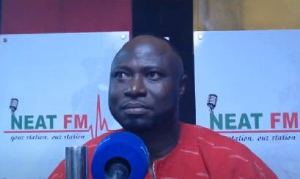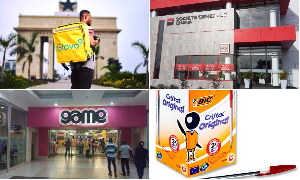Music of Saturday, 23 June 2007
Source: ghanamusic.com
BUSAC Support For Ghana's Music Industry
The Business Sector Advocacy Challenge (BUSAC) Fund has released about 680 million cedis to the Ghana Association of Phonographic Industry (GAPI) to undertake advocacy initiatives to ensure Ghanaian Music Industry benefited from long term national, international and multi-lateral financing.
Mr Francis Mensah Twum, General Secretary of GAPI told the Ghana News Agency (GNA) that the support came in the nick of time, adding "the Ghanaian music industry is in its elements and there could not have been any better time to capitalize on the available prospects.
" BUSAC is a fund initially set up by Danish International Development Agency (DANIDA) to assist civil society, private sector, trades unions and the media to influence national policies of developing countries through advocacy.
The fund is also supported by United States Agency for International Development (USAID) and Department for International Development (DFID) of United Kingdom.
As part of the GAPI advocacy initiative, which would include workshops, seminars and other interactive forums between stakeholders in the industry, policy makers and the media, Global View Consult (GVC) has been consulted to conduct research into the history, evolution and current state of the music industry in Ghana.
Mr Twum observed that the history of Ghanaian music on the international scene indicated that top gun industry players from developed countries were willing to finance the production and promotion of Ghanaian music provided the necessary protective structures and policies were instituted.
He acknowledged that inclusion of the music industry in the Ghana Poverty Reduction Strategy (GPRS II) 2006-2009, was a step in the right direction, to provide a holistic approach to address challenges facing the industry as a matter of policy.
The GPRSII proposes to deal with issues of legal and regulatory framework for promoting music, human and institutional resource capacity building as well as ICT and multimedia technological support.
Mr Twum said as a follow up to the research, GAPI would soon organize series of workshops and seminars to create interactive forums between stakeholders in the industry and policy makers to map out the way forward to realize the targets of GPRS II for the music industry.
An initial draft report of the research made available to GNA indicated that in 2000, the World Bank provided part of its 300 million dollars cultural support budget to specifically assist music industries in six African countries including Ghana.
It said for the past seven years not much had been done locally to access the funds to improve the local music industry. "On the contrary the industry remained plagued with lack of finance, limited application of modern technology and lack of effective laws and regulation to protect intellectual property," it added.
The report identified piracy and high cost of music production and promotion as challenges affecting the creativity and development of the industry and musicians in particular.
It said the advocacy initiative was intended to bring to the fore challenges and potentials in the Ghanaian music industry, its economic value to make national policy makers realize the need to support measures towards long term financing in the industry.
The initiative would also provide stakeholders in the industry the opportunity to produce a document for discussion and as a policy reference. The report noted that besides the long term financial support available at the World Bank, the United Nations Conference on Trade and Development (UNCTAD) had also established the Music Industry Development Initiative (MIDI) since 2001 to assists music industries in less developed countries (LDCs) in capacity-building for creativity and commercialisation skills.
It said the establishment of MIDI was part of measures to link Ghanaian music industry with international industry giants and record labels like Capital EMI, Sony BMG and Warner Brothers to ensure creative international market for Ghanaian music.
The report quoted Professor John Collins, a Lecturer at School of Performing Arts of University of Ghana, saying the Ghanaian music industry had the potential to generate at least 53 million dollars annually from the world music market, when the necessary structures, international links and state support systems were instituted and made to work.
"Any developing country with such a huge prospect has an obligation to take the necessary steps to stimulate the flow from such a revenue stream into its economy," the report said.
However, it noted that, whereas all the financial and technical support systems were firmly in place within the international community for Ghana to realize its potential on the world music market, administrative and legal structures as well as the necessary policies needed to access the support and to engender world class investor confidence was lacking.










